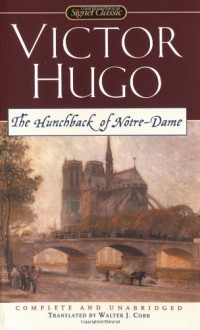
by Victor Hugo
This Classic was originally written in French and I've found that the translation does make a difference. I have a paperback copy from Penguin, translated by John Sturrock and my first impression was that the writing was very poetic, but I got the free Kindle version from Gutenberg with a different translator because it's easier for me to read on Kindle and in this one, the first chapters felt overly wordy and dragged a little.
I persisted though. I've seen various film versions of this story and didn't recognise most of the names I was reading until we finally meet Quasimodo in chapter five, followed by Esmerelda, though Gringoire who falls foul of the Paris underworld does make an appearance in the old 1939 black and white Charles Laughton version. From Quasimodo's introduction the story digressed into the history of Notre Dame Cathedral.
This one takes a little patience because there are many digressions. Life in fifteenth century Paris under Louis the XI, individual character histories and other commentaries on the times all come together to form a very thorough picture of the circumstances surrounding the familiar story line, but they do break continuity.
The extent to which Quasimodo's story intertwines with Esmerelda's was never fully expressed in the movies. I found the connections very interesting indeed! And Frollo was given a bit of undeserved bad press, especially by Disney. Movies require a villain and a priest immersed in austerity isn't a sympathetic character, but his reasons for adopting Quasimodo were based in charity, not obligation.
Quasimodo's back story is revealed in reverse, first showing us his experience with the Feast of Fools, then later revealing how he came to be ward of Frollo, and after that his origins and how he came into Frollo's path. Then later we move forward.
While the book would never get commercial publication in today's publishing market due to the extent of the digressions, the story is well told as a whole and the Classic enthusiast is likely to enjoy the fullness of the description and depiction of the time and place and how it shapes the events of the plot. I'm glad to have read it now and will look on film repeats with a more detailed knowledge of the whole of the story.
A worthwhile Classic, for those who have the patience to assimilate a fair bit of history between story events.

 Log in with Facebook
Log in with Facebook 














